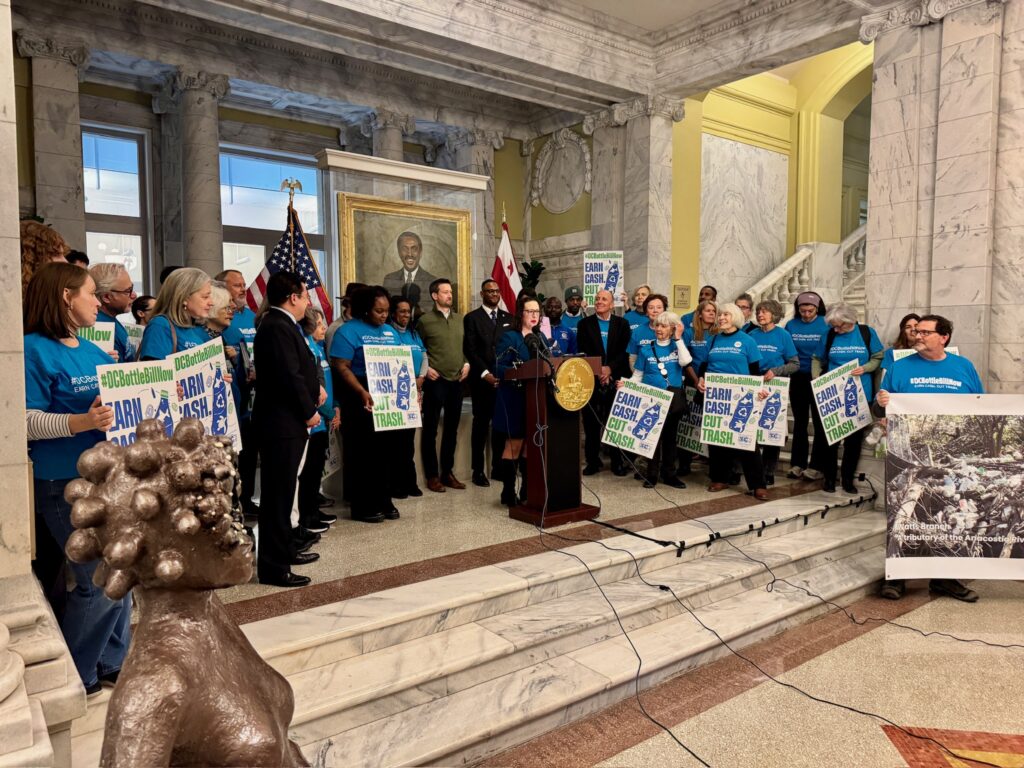Eleven councilmembers introduce bill requiring deposits on beverage containers, proven to drastically reduce litter in streets, parks and rivers
WASHINGTON, D.C.— Councilmember Brianne K. Nadeau, D-Ward 1, today announced major environmental legislation that would drastically reduce litter in streets, parks and rivers by placing a refundable ten-cent deposit on beverage containers sold in the District.
The Recycling Refund and Litter Reduction Amendment Act of 2025 establishes a beverage container deposit program in the District in which retailers collect a 10-cent deposit on applicable beverages and consumers are refunded that deposit when they return the empty beverage containers to be recycled. The program, which would be managed by a nonprofit funded by beverage distributors, would be overseen and enforced by the Department of Energy and the Environment.
“The promise that was made to my generation years ago, that if we dutifully put our recycling into the bin it would not end up in landfills, is a lie. In fact, the majority of it is not being recycled,” said Nadeau. “There is a solution. The District’s bottle bill is projected to increase recycling rates by more than three times and cut the number of containers that end up in the incinerator, landfill, or the environment by five times. A bottle deposit program will have a profound impact on the environment and on the quality of life in our city and will get us one giant step closer to meeting our zero waste goals.”
Council Chairman Phil Mendelson and Councilmembers Charles Allen, Brooke Pinto, Matthew Frumin, Janeese Lewis George, Anita Bonds, Christina Henderson, Robert C. White, Jr., Zachary Parker, and Wendell Felder all co-introduced the legislation with Nadeau.
The District of Columbia has a significant litter issue. Of particular concern are beverage containers, which end up on the ground and in our waterways by the ton. Plastic bottles alone account for 60 percent of the weight of all trash retrieved from the Anacostia River. Many of these containers end up going to landfill rather than getting recycled.
Beverage container deposit programs have been shown to have a significant impact on increasing recycling rates and reducing overall litter.
“For over a decade now Anacostia Riverkeeper has been managing trash traps and running volunteer cleanups in DC, consistently finding more plastic bottles and other beverage containers than any other litter type,” said Trey Sherard, the Anacostia Riverkeeper. “That’s a terrible shame but it’s also an opportunity because it means that this bill being introduced today could halve the amount of litter in DC’s neighborhoods and in DC’s waterways.”
The 10 states that have passed and implemented similar legislation witnessed immediate and significant increases in removing bottles and cans from the waste stream, because residents, visitors, and collectors alike are incentivized to redeem their containers. In Michigan, the return rate for bottles is 73 percent. In Maine, it’s 77 percent. These programs have also reduced other litter.
The bill will also save the District money, because so much weight that would have gone into the trash or into traditional recycling will now be redeemed. D.C.’s curbside recycling (DPW) weight is expected to drop about 20 percent.
Beverage container deposit programs can generate income for entrepreneurs, including people who have no other income and earn money by collecting bottles which they remove from the trash and the street, and businesses that help collect and move bottles and cans for recycling.
Lora Nunn, president of the Friends of Kingman & Heritage Islands, said the bottle deposit bill would improve the lives of District children.
“D.C. needs a bottle bill to support the needs of our youth,” she said. “Our kids have not only been empowered to address the impact of trash in our community in the classroom but also through the programs offered at places like Kingman Island. A strong bottle bill would be a critical tool in the effort students are already making to improve our community and ensure that everyone is part of the campaign to reduce trash in the places our kids learn and grow.”
The legislation promotes environmental justice by reducing the disproportionate amount of litter ending up in wards 5, 6, 7, and 8, along the Anacostia River, and greatly reducing the material that gets burned up at the incinerator in Lorton, Virginia, a predominantly Black and Brown community, where the facility emits toxic chemicals.
Damian Bascom of Black-led Zero Waste and Beautify DC and a Ward 8 resident said the proposed bottle bill represents an opportunity for low-income individuals to create better livelihoods, pointing to the example of “canners” in New York.
“For residents east of the Anacostia where financial insecurity is a daily challenge, this bill can be a lifeline by creating pathways to supplemental income,” Bascom said. “Imagine a young person using this to buy school supplies, or a parent using it to keep food on their table. Bottle bills are not just about recycling – they are about sustainability, equality, and dignity.”
If the bill passes, D.C. would be the first state in over 20 years to implement a beverage container deposit bill. Maryland also introduced a bottle bill this year.
“A strong bottle bill in D.C. would dramatically cut trash pollution in our rivers, our parks, and our neighborhoods,” said Christopher E. Williams, president of the Anacostia Watershed Society. “How can I be so sure? Because bottle bills have been operating in 10 states for decades, and in every one the data are conclusive: Recycling rates go way up, and litter from bottles and cans goes way down.”
More information, including a copy of the bill text and frequently asked questions, can be found here.
###
